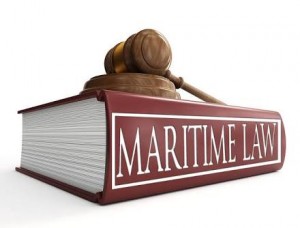The trouble with the laws these days is that criminals know their rights better than their wrongs
trouble with the laws these days is that criminals know their rights better than their wrongs
Like the quote above, the Nigerian maritime sector has evolved to the extent that the defaulters of the law seem to have a better understanding of the laws in the maritime parlance than the lawyers and judges are only left with peripheral knowledge.

Maritime law is also known as Admiralty law. It is a distinct body of law that governs maritime questions and offenses. It is a body of laws, conventions and treaties that governs international private business or other matters involving ships, shipping or crimes occurring on open water.
Maritime law governs many of the insurance claims relating to ships and cargo, civil matters between ship owners, seamen and passengers, and piracy. Additionally, maritime law regulates the registration, license, and inspection procedures for ships and shipping contracts, maritime insurance and the carriage of goods and passengers.

There has been consistent recommendation from the bi-annual maritime seminar for judges, Nigerian Shippers’ Council and National University Commission to work together on the introduction of Maritime law as a course of study in Nigerian universities.

This agreement evolved as a result of reduction in the number of legal practitioners who are knowledgeable in maritime law, a situation which has hindered the proper administration of maritime cases in the country.
Since the course was not available in the country’s universities, Nigerians interested in developing a career in admiralty practice had to undertake such course abroad at a great cost.
However, the introduction of maritime law as a course in the university will equip judges and lawyers with a better grasp of the subject matter as they are able to understand what the profession is all about. Judges called to dispense justice on maritime issues often found it difficult because they were not taught at under graduate or post graduate level.
This plan by the federal government will bring the profession into light thereby making the young ones aware of the benefits associated with the profession while it will also boost the profession and take it to greater height as the legal practitioners get a better understanding of the field.
The students will acquire experience in resolution of claims relating to charter parties, cargo, collision, demurrage and damages for detention, sale and purchase of vessels, ownership of vessels, arrest and release of ships, and negotiation of settlement of claims.
The importance of Maritime sector to the development of national economy could not be overemphasized as it contributed a lot the Gross Domestic Product and created employment. If properly harnessed, the sector was a veritable source of economic sustenance and diversification, adding most countries derived 90 per cent of their revenue from the sector
It is therefore important that the future generations are aware of the benefits in the industry and the richer the understanding of maritime law and the industry peculiarities by the judiciary, the better their cases and judgments.
 MMS PLUS NG – Maritime, Aviation, Business, Oil and Gas News Online Newspaper with coverage in Maritime, Oil and Gas, Aviation, Power and Energy as well as Financial News
MMS PLUS NG – Maritime, Aviation, Business, Oil and Gas News Online Newspaper with coverage in Maritime, Oil and Gas, Aviation, Power and Energy as well as Financial News









